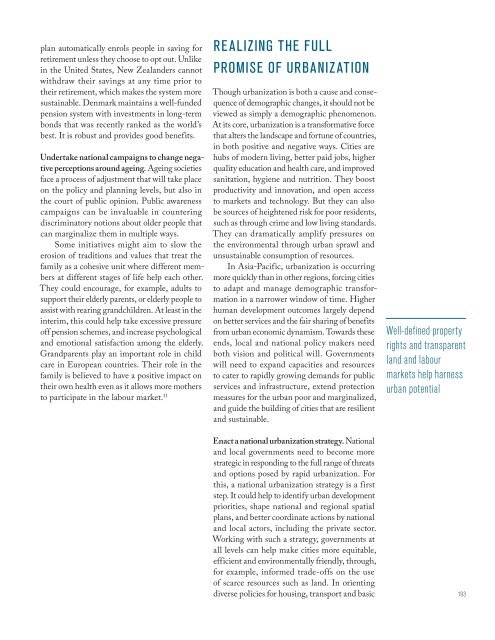SHAPING THE FUTURE HOW CHANGING DEMOGRAPHICS CAN POWER HUMAN DEVELOPMENT
1VPo4Vw
1VPo4Vw
Create successful ePaper yourself
Turn your PDF publications into a flip-book with our unique Google optimized e-Paper software.
plan automatically enrols people in saving for<br />
retirement unless they choose to opt out. Unlike<br />
in the United States, New Zealanders cannot<br />
withdraw their savings at any time prior to<br />
their retirement, which makes the system more<br />
sustainable. Denmark maintains a well-funded<br />
pension system with investments in long-term<br />
bonds that was recently ranked as the world’s<br />
best. It is robust and provides good benefits.<br />
Undertake national campaigns to change negative<br />
perceptions around ageing. Ageing societies<br />
face a process of adjustment that will take place<br />
on the policy and planning levels, but also in<br />
the court of public opinion. Public awareness<br />
campaigns can be invaluable in countering<br />
discriminatory notions about older people that<br />
can marginalize them in multiple ways.<br />
Some initiatives might aim to slow the<br />
erosion of traditions and values that treat the<br />
family as a cohesive unit where different members<br />
at different stages of life help each other.<br />
They could encourage, for example, adults to<br />
support their elderly parents, or elderly people to<br />
assist with rearing grandchildren. At least in the<br />
interim, this could help take excessive pressure<br />
off pension schemes, and increase psychological<br />
and emotional satisfaction among the elderly.<br />
Grandparents play an important role in child<br />
care in European countries. Their role in the<br />
family is believed to have a positive impact on<br />
their own health even as it allows more mothers<br />
to participate in the labour market. 11<br />
REALIZING <strong>THE</strong> FULL<br />
PROMISE OF URBANIZATION<br />
Though urbanization is both a cause and consequence<br />
of demographic changes, it should not be<br />
viewed as simply a demographic phenomenon.<br />
At its core, urbanization is a transformative force<br />
that alters the landscape and fortune of countries,<br />
in both positive and negative ways. Cities are<br />
hubs of modern living, better paid jobs, higher<br />
quality education and health care, and improved<br />
sanitation, hygiene and nutrition. They boost<br />
productivity and innovation, and open access<br />
to markets and technology. But they can also<br />
be sources of heightened risk for poor residents,<br />
such as through crime and low living standards.<br />
They can dramatically amplify pressures on<br />
the environmental through urban sprawl and<br />
unsustainable consumption of resources.<br />
In Asia-Pacific, urbanization is occurring<br />
more quickly than in other regions, forcing cities<br />
to adapt and manage demographic transformation<br />
in a narrower window of time. Higher<br />
human development outcomes largely depend<br />
on better services and the fair sharing of benefits<br />
from urban economic dynamism. Towards these<br />
ends, local and national policy makers need<br />
both vision and political will. Governments<br />
will need to expand capacities and resources<br />
to cater to rapidly growing demands for public<br />
services and infrastructure, extend protection<br />
measures for the urban poor and marginalized,<br />
and guide the building of cities that are resilient<br />
and sustainable.<br />
Enact a national urbanization strategy. National<br />
and local governments need to become more<br />
strategic in responding to the full range of threats<br />
and options posed by rapid urbanization. For<br />
this, a national urbanization strategy is a first<br />
step. It could help to identify urban development<br />
priorities, shape national and regional spatial<br />
plans, and better coordinate actions by national<br />
and local actors, including the private sector.<br />
Working with such a strategy, governments at<br />
all levels can help make cities more equitable,<br />
efficient and environmentally friendly, through,<br />
for example, informed trade-offs on the use<br />
of scarce resources such as land. In orienting<br />
diverse policies for housing, transport and basic<br />
Well-defined property<br />
rights and transparent<br />
land and labour<br />
markets help harness<br />
urban potential<br />
193


